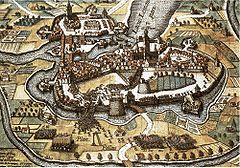L'Escalade
| Fête de l'Escalade | |
|---|---|

L'Escalade celebrating the defeat of the surprise attack by troops sent by Charles Emmanuel I, Duke of Savoy
|
|
| Observed by | Geneva, Switzerland |
| 2016 date | 9 December to 11 December |
| Frequency | annual |
L'Escalade, or Fête de l'Escalade (from escalade, the act of scaling defensive walls), is an annual festival held in December in Geneva, Switzerland, celebrating the defeat of the surprise attack by troops sent by Charles Emmanuel I, Duke of Savoy during the night of 11–12 December 1602. The celebrations and other commemorative activities are usually held on 12 December or the closest weekend.
For years, the duke coveted the wealth of the city-state, which was not then a member of the Swiss Confederation. When Charles Emmanuel came to the throne of the House of Savoy in 1580, he longed to make Geneva his capital north of the Alps and crush Protestantism. Pope Clement VIII offered encouragement; in 1602 he appointed as Catholic bishop of Geneva Francis de Sales, an effective preacher who had recently been successful in re-Catholicizing the Chablais district of Savoy on the south side of Lake Geneva.
On December 11 and December 12 (Old Style) 1602 — the darkest night of the year — the forces of the Duke of Savoy, under the command of the seigneur d'Albigny, and those of Charles Emmanuel's brother-in-law, Philip III of Spain, launched an attack on the city-state of Geneva. The troops marched along the Arve River at night and assembled at Plainpalais, just outside the walls of Geneva, at 2 o'clock in the morning. The original plan was to send in a group of commandos to open the city gate and let the other troops in. The Geneva citizens defeated the invaders by preventing them from scaling the wall using cannon fire, and by fighting in the streets against the few who managed to climb over (a climb in French is an escalade). The alarm was raised, the church bells were rung and the Genevese were alerted. The night guard Isaac Mercier succeeded in cutting the rope holding up the portcullis, thus foiling the plan to open the main city gate. The populace fought alongside their town militia and the duke's 2000-plus mercenaries were defeated. The Genevese lost 18 men in the fighting; the Savoyards suffered 54 fatalities and the troops had to retreat. Thirteen invaders who had been taken prisoner, including several well-born gentlemen, were summarily hanged the following day as brigands, since they could not be treated as prisoners of war, peace having been repeatedly sworn on the part of Savoy.
...
Wikipedia
